Towns gear up for Whit Friday brass band contests
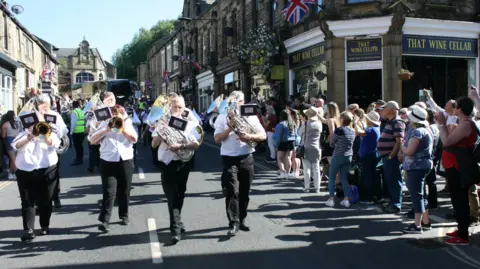 Bob Rodgers
Bob RodgersThousands of people will line the streets for a celebration of brass band music.
More than a hundred bands will compete against each other later at 21 venues across towns and villages in Tameside and Saddleworth in Greater Manchester.
The contests are a tradition which date back around 150 years.
The competitions are linked to local churches, which organise walks on Whit Friday, with a brass band leading the procession.

Cat Tomlisson is the organiser of the Tameside brass band contests.
She said: "It's a massive deal for all the bands that compete. We have bands from across Europe.
"Children compete against local bands, experienced bands and old colliery bands.
"There's food, there's drink and the brass is just a wonderful sound. Anyone listening cant help but smile."
She added: "I used to come as a child with my family to watch and listen. It fills you with joy."
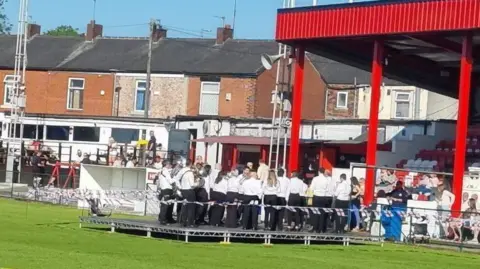 Andy Clayton
Andy ClaytonIn Tameside, the contests are taking place at 10 venues including in Denton, Ashton-under-Lyne, Mossley, Dukinfield and Hyde.
In Saddleworth, there are 11 venues including the villages of Dobcross, Diggle, Uppermill and Delph.
Bands travel between each venue, competing for cash prizes - often of more than £1000 for each contest.
'The greatest free show on Earth'
The brass band contests are often described as "the greatest free show on Earth".
They are open to all-comers, so the local youth bands get to match their skills against the top bands in the country.
The judges sit with their backs to the stage, often in caravans, so the bands only get scored on the music they perform.
The competitors dash from contest to contest with their instruments - performing in front of thousands of spectators.
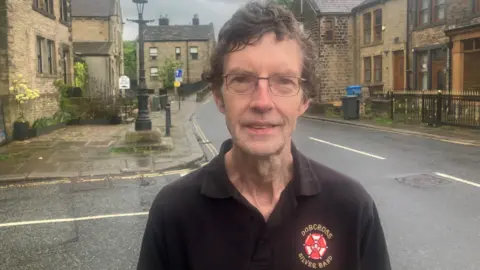
Andy Black is the Chairman of the Dobcross Silver Band, which will be celebrating its 150th anniversary in 2025.
He said they always took part in the church parade in the morning before competing in the contests in the afternoon.
"The day starts early in the morning with the church congregations getting together. We then march into the village square before a church service.
"In the afternoon, we then get into the serious businesses of competing. We get on the coach and try to get to as many contests as we can.
"We may have to queue up behind other bands, but as soon as its our chance, we get on the stage and play.
"We normally compete in seven or eight contests. Its organised chaos but we all enjoy it that's for sure."
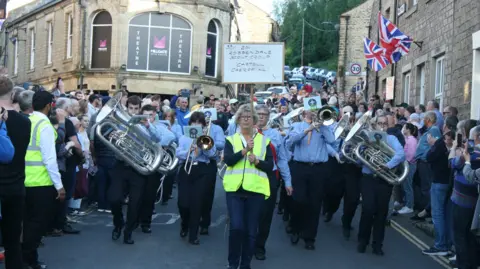 Bob Rodgers
Bob RodgersWhit Friday takes place on the first Friday after Pentecost, a feast which commemorates the descent of the Holy Spirit on the Apostles on the 49th day after Easter.
It was a popular time for baptisms, when children would dress in white.
Eventually, this became known as Whit(e) Friday and was an opportunity for newly baptised children and church congregations to display their faith by marching through the streets.
The parades would be led with banners and brass band music.
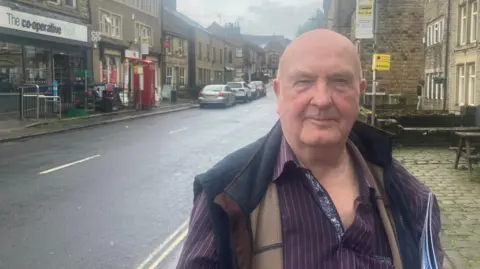
Bob Rodgers organises the brass band contests in the villages of Saddleworth.
He said: "The brass bands were created by the owners of the local mills and factories in the 19th century.
"They often bought the instruments for the worker - the contests took place after the church processions.
"The brass bands would get together outside the pub and argue about who could play best.
"That's how the tradition began. The bands in each village liked to outdo each other".
In Saddleworth, children are given the day off school to celebrate Whit Friday.
Bob Rodgers said: "Its just incredible. In the village of Delph, we get one band every six minutes for eight hours, so that's 80 bands.
"That's incredible entertainment for the people on the street. It's the best day of the year for a lot of people in Saddleworth.
"If you had to choose between Christmas and Whit Friday, you'd choose Whit Friday."
Listen to the best of BBC Radio Manchester on Sounds and follow BBC Manchester on Facebook, X and Instagram. You can also send story ideas to [email protected]
